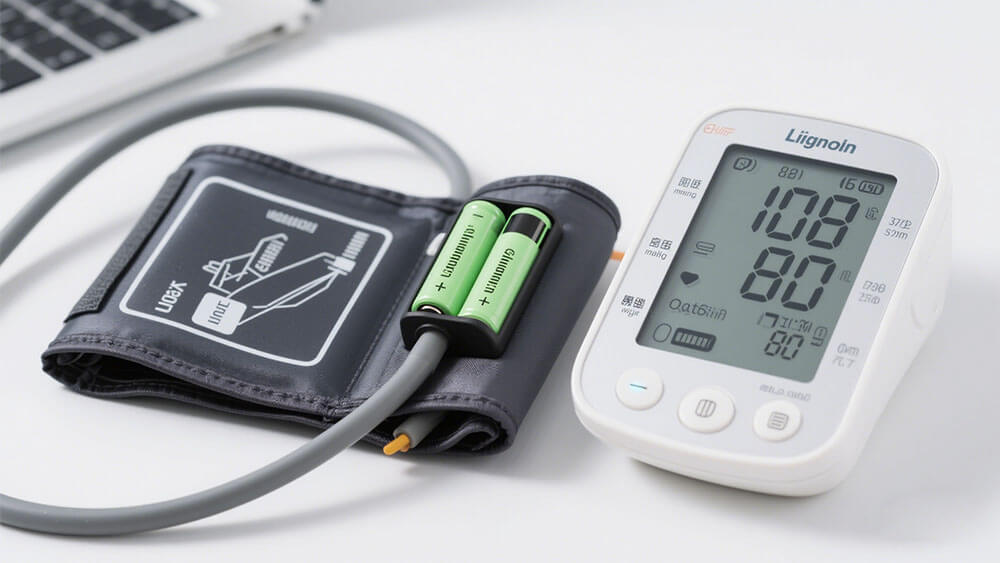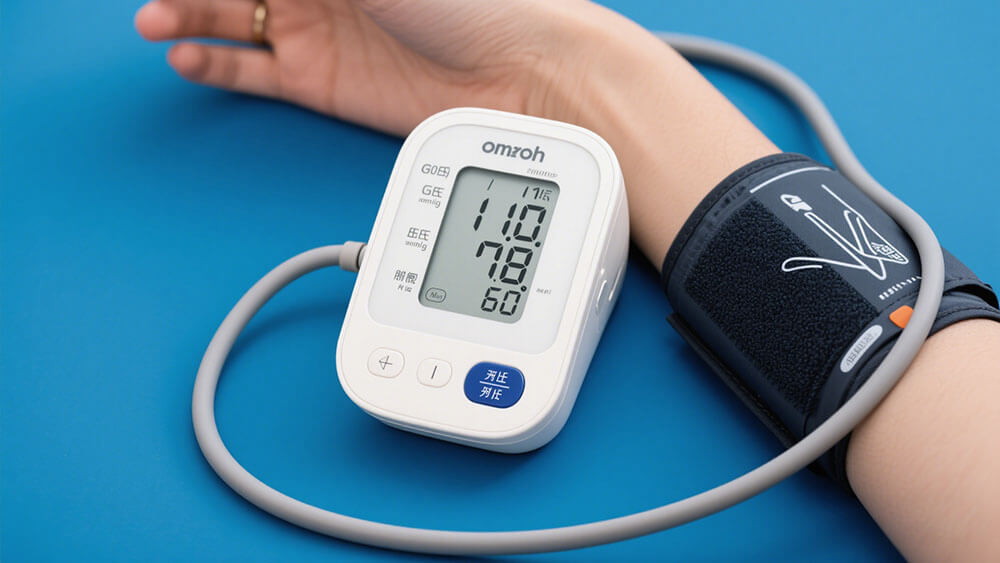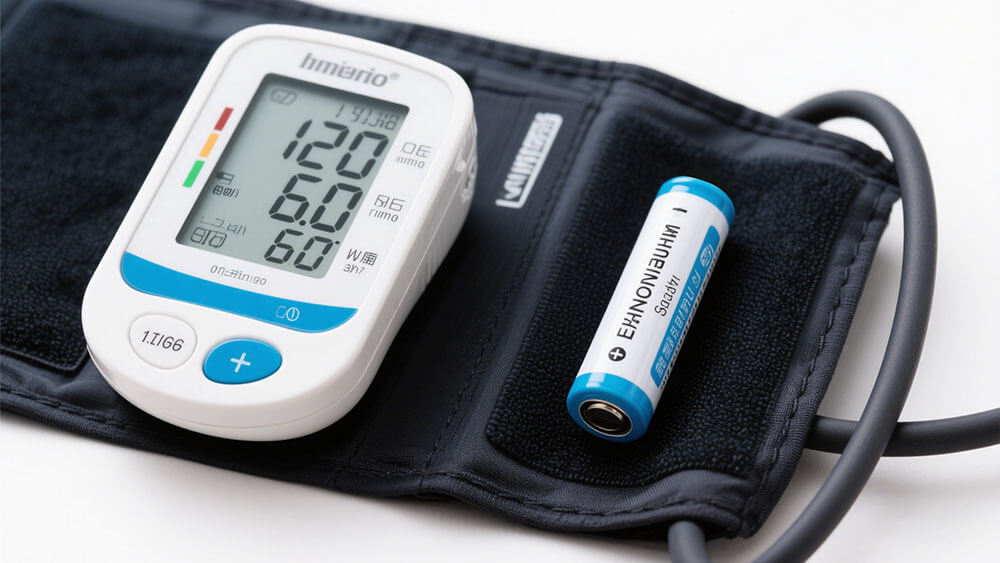-
Key Takeaways
-
Part 1: Comparing Lithium Batteries to Other Battery Types+
- 1.1 Lithium vs. Alkaline Batteries for Blood Pressure Monitors
- 1.2 Lithium vs. NiMH Batteries: Performance and Reliability
- 1.3 Cost vs. Performance: Why Lithium is Ideal for Medical Applications
-
Part 2: Benefits of Lithium Batteries for Blood Pressure Monitors+
- 2.1 Consistent and Accurate Readings with Lithium Power
- 2.2 Reduced Downtime and Maintenance for Home Blood Pressure Monitors
- 2.3 Enhanced Portability and Reliability in Clinical and Home Use
- 2.4 Improved Safety Standards in Medical Device Applications
-
Part 3: Practical Tips for Choosing and Using Lithium Batteries+
- 3.1 Selecting the Right Lithium Battery Pack for Blood Pressure Monitors
- 3.2 Ensuring Compatibility with Blood Pressure Monitor Models
- 3.3 Proper Storage and Handling of Lithium Batteries in Medical Settings
-
FAQ+
- 1. What makes lithium-ion batteries suitable for medical devices like blood pressure monitors?
- 2. How do lithium batteries improve the accuracy of blood pressure monitors?
- 3. Can I customize lithium battery packs for specific blood pressure monitor models?
How Lithium Batteries Improve Blood Pressure Monitor Performance
May 07, 2025 Pageview:940

Lithium batteries deliver unmatched energy efficiency and durability, making them the preferred choice for powering blood pressure monitors. You benefit from reliable performance that ensures consistent readings, even during extended use. By reducing the need for frequent replacements, lithium batteries optimize blood pressure monitor battery life, enhancing the reliability of medical devices in critical applications.
Key Takeaways
Lithium batteries give steady power to blood pressure monitors. This helps get correct readings and lowers how often you change batteries.
Using lithium batteries makes your blood pressure monitor last longer. It saves you time and money on buying new batteries.
Pick good-quality lithium batteries that follow safety rules from Large Power. This keeps your medical devices working well and safe to use.

Part 1: Comparing Lithium Batteries to Other Battery Types
1.1 Lithium vs. Alkaline Batteries for Blood Pressure Monitors
When comparing lithium batteries to alkaline batteries, the differences in performance and reliability become evident. Alkaline batteries, while inexpensive and widely available, lack the energy density required for consistent operation in medical devices like blood pressure monitors. They often fail to deliver stable power output, leading to inaccurate readings or device malfunctions.
In contrast, lithium batteries provide a higher energy density, ensuring your blood pressure monitor operates reliably over extended periods. Their ability to maintain a consistent voltage throughout their lifespan minimizes the risk of power fluctuations. This feature is critical for medical applications, where precision and reliability are non-negotiable. Additionally, lithium batteries perform well in a wide range of temperatures, making them suitable for both home and clinical environments.
Tip: If you want your blood pressure monitor to deliver accurate readings consistently, consider switching to lithium batteries. Their superior performance justifies the slightly higher initial cost.
1.2 Lithium vs. NiMH Batteries: Performance and Reliability
Nickel-metal hydride (NiMH) batteries are another alternative often used in rechargeable devices. However, they fall short when compared to lithium batteries in terms of performance and reliability. NiMH batteries have a lower energy density, which means they require frequent recharging. This can be inconvenient, especially for medical devices that demand uninterrupted power.
Lithium batteries, on the other hand, excel in longevity and efficiency. With over 500 charge-discharge cycles, they significantly reduce the need for replacements. Their high energy density—up to 270 Wh/kg—ensures long-lasting performance, even in power-intensive devices like blood pressure monitors. Moreover, lithium batteries comply with stringent safety standards, reducing the risk of overheating or leakage by over 40% in the past five years.
1.3 Cost vs. Performance: Why Lithium is Ideal for Medical Applications
While lithium batteries may have a higher upfront cost, their long-term benefits far outweigh the initial investment. A cost-benefit analysis reveals that lithium batteries are more economical over time due to their durability and efficiency.
High Energy Density: Lithium batteries deliver up to 270 Wh/kg, ensuring long-lasting performance.
Longevity: With over 500 charge-discharge cycles, they minimize replacement frequency.
Safety Compliance: Their adherence to safety standards reduces incidents, making them a safer choice for medical applications.
Battery Type | Initial Cost | Long-term Savings |
|---|---|---|
Lithium-Ion | Higher | More economical |
Lead-Acid | Lower | Less economical |
Sodium-Ion | Moderate | Moderate savings |
For blood pressure monitors, the consistent power output of lithium batteries ensures accurate readings and reduces maintenance costs. This reliability is crucial in medical settings, where device performance directly impacts patient care. By investing in lithium batteries, you not only enhance the functionality of your blood pressure monitor but also save on long-term operational costs.

Part 2: Benefits of Lithium Batteries for Blood Pressure Monitors
2.1 Consistent and Accurate Readings with Lithium Power
Lithium batteries play a crucial role in ensuring consistent and accurate readings in blood pressure monitors. Their ability to maintain a stable voltage throughout their lifespan minimizes power fluctuations, which can otherwise compromise the accuracy of your device. Unlike other battery types, lithium batteries deliver a steady energy output, even as they near the end of their charge cycle. This reliability is essential for medical devices, where precision is non-negotiable.
For example, when using a blood pressure monitor powered by lithium batteries, you can trust the device to provide accurate readings without the need to frequently check for accuracy. This consistency is particularly beneficial in clinical settings, where multiple readings are taken daily, and in home environments, where users rely on the monitor for self-care.
Note: To achieve the most accurate readings, always ensure your blood pressure monitor battery is fully charged or replaced promptly when needed.
2.2 Reduced Downtime and Maintenance for Home Blood Pressure Monitors
Lithium batteries significantly reduce downtime and maintenance requirements for home blood pressure monitors. Their long lifespan and high energy density mean you won’t need to replace batteries as often, saving both time and money. With over 500 charge-discharge cycles, lithium batteries outlast traditional alkaline or NiMH options, making them a cost-effective choice for long-term use.
For home users, this translates to fewer interruptions in monitoring your health. You can rely on your device to function optimally without frequent battery replacements. Additionally, lithium batteries are less prone to leakage, reducing the risk of damage to your monitor and ensuring its longevity.
Tip: To maximize the lifespan of your lithium batteries, store them in a cool, dry place and avoid overcharging.
2.3 Enhanced Portability and Reliability in Clinical and Home Use
Lithium batteries enhance the portability and reliability of blood pressure monitors, making them ideal for both clinical and home use. Their lightweight design and high energy capacity allow manufacturers to create compact, user-friendly devices without compromising performance.
Feature | Description |
|---|---|
Weight | Lightweight without batteries, enhancing portability. |
Battery Life | Large-capacity rechargeable lithium battery can be used about 500 times when fully charged. |
Certification | Accurate data with CE, ISO13485 authoritative certification, ensuring reliability. |
The table above highlights the features that make lithium-powered blood pressure monitors a practical choice for everyday use. Whether you’re a healthcare professional or a home user, these devices offer the convenience and dependability you need.
2.4 Improved Safety Standards in Medical Device Applications
Lithium batteries meet stringent safety standards, making them a reliable choice for medical device applications. Certifications such as IEC 62133, UL 2054, and ISO 13485 ensure that these batteries comply with international safety and quality requirements.
Standard | Description |
|---|---|
IEC 62133 | International standard for safety of secondary cells and batteries, includes biocompatibility and safety features for medical use. |
UL 2054 | Safety standard for batteries, covering electrical, mechanical, environmental, and thermal safety. |
ISO 13485 | Ensures a quality management system is in place for producing safe and reliable medical device batteries. |
These certifications demonstrate the commitment to safety and reliability in lithium battery technology. For blood pressure monitors, this means reduced risks of overheating, leakage, or device failure. You can trust that your device will perform safely and effectively, even under demanding conditions.
Callout: When selecting a blood pressure monitor, prioritize models powered by lithium batteries with recognized safety certifications. This ensures both the safety of the device and the accuracy of its readings.

Part 3: Practical Tips for Choosing and Using Lithium Batteries
3.1 Selecting the Right lithium battery pack for Blood Pressure Monitors
Choosing the right lithium battery pack for your blood pressure monitor is essential for ensuring optimal performance and reliability. Medical devices, including blood pressure monitors, require batteries that are reliable, long-lasting, and compliant with strict regulatory standards. Always prioritize high-quality batteries from reputable brands to guarantee consistent performance and a longer lifespan.
Follow the manufacturer’s recommendations when selecting a battery pack. Using the wrong type can lead to device malfunctions or inaccurate readings. For example, some monitors may require specific lithium-ion batteries to maintain compatibility and safety. Opting for batteries with a longer life reduces the frequency of replacements, saving you time and effort while maintaining the functionality of your device.
Tip: Look for certifications like IEC 62133 or UL 2054 when purchasing lithium batteries. These standards ensure the battery meets safety and quality requirements for medical applications.
3.2 Ensuring Compatibility with Blood Pressure Monitor Models
Ensuring compatibility between your lithium battery pack and your blood pressure monitor model is crucial. Not all lithium batteries are universally compatible, so verify the specifications of your device before purchasing. Check the voltage, capacity, and size requirements outlined in the user manual.
Some blood pressure monitors, especially those with advanced features like an automatic cuff, may require specific battery configurations. Using incompatible batteries can lead to reduced battery life or even damage to the device. If you’re unsure, consult the manufacturer or a professional to confirm compatibility.
Callout: Compatibility ensures your monitor operates efficiently, providing accurate readings and extending the overall lifespan of the device.
3.3 Proper Storage and Handling of Lithium Batteries in Medical Settings
Proper storage and handling of lithium batteries are vital for maintaining their performance and safety. Store batteries in a cool, dry place away from direct sunlight or extreme temperatures. High temperatures can degrade the battery’s life, while cold environments may reduce its efficiency temporarily.
When handling lithium batteries, avoid exposing them to moisture or physical damage. For medical settings, ensure that batteries are stored in their original packaging or a designated container to prevent accidental short circuits. Regularly inspect batteries for signs of wear, such as swelling or leakage, and replace them immediately if any issues are detected.
Note: Proper storage and handling not only extend the battery’s lifespan but also ensure the safety of your medical devices.
Lithium batteries offer unmatched performance for powering your blood pressure monitor. Their high energy efficiency and long lifespan ensure consistent readings, reducing the need for frequent replacements. For home blood pressure monitor users, this means less downtime and reliable operation. By selecting the right blood pressure monitor battery and following proper usage guidelines, you can maximize the benefits of these advanced batteries. Investing in lithium batteries enhances the functionality of your device, making them a valuable choice for medical applications.
Tip: For customized lithium battery solutions tailored to your medical devices, explore Large Power’s offerings here: Custom Lithium Battery Solutions.
FAQ
1. What makes lithium-ion batteries suitable for medical devices like blood pressure monitors?
Lithium-ion batteries offer high energy density, long lifespan, and consistent power output. These features ensure reliable performance in medical devices.
2. How do lithium batteries improve the accuracy of blood pressure monitors?
Lithium batteries maintain stable voltage, reducing power fluctuations. This stability ensures accurate readings, critical for medical applications. Explore medical battery solutions for more details.
3. Can I customize lithium battery packs for specific blood pressure monitor models?
Yes, you can customize lithium battery packs to meet specific device requirements. Contact Large Power for tailored solutions for your medical devices.
Leave Message
Hottest Categories
-
Hottest Industry News
-
Latest Industry News









